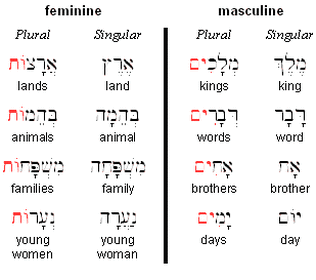
Nouns in Hebrew: Gender
All Hebrew nouns are either feminine or neuter. Hebrew does not carry a "neuter" gender, as Biblical Greek does.
While there are some predictable patterns in determining a noun's gender,the only absolute way to determine a noun's gender is to look it up in a Hebrew lexicon or dictionary.
Feminine Nouns — Singular
Here are some quick "identifiers" for the feminine noun:
Masculine nouns, in the singular, are unpredictable! Use a Hebrew lexicon if you need to be certain of the gender of a noun.
Hebrew Plural Nouns
Feminine Plural Nouns
Most feminine plural nouns end in holem-vav-tav (e.g. horses, סוסות). BUT there are a few that end in hireq-yod-mem (which you will see is usually reserved for masculine plurals)
Masculine Plural Nouns
Happily, unlike singular nouns, the masculine plural is identified by the hireq-yod-mem suffix (e.g. men, אנשׁים).
BUT, there are some masculine plurals that take the usual feminine plural ending of the holem-vav-tav! For example, father is masculine, but fathers (plural) in Hebrew takes the "normal" feminine ending, אבות.
"Dual" Nouns
As the name implies, "dual" nouns name things that occur in pairs, especially body parts such as ears, hands, etc. Although some nouns take the dual ending that do not occur in pairs, such as water (מים). The dual ending is normally accented patah-yod-hireq-mem. For example hands, ידים.
Mnemonics to Remember Noun Endings
Generally, mnemonics aren't needed to remember the endings, as they are pretty simple. But here are some helpful tips if you need a little memory "nudge!"
More Biblical Hebrew Memory Helps!
I hope this article on learning the gender and number of nouns in Hebrew has helped you! For more powerful memory helps in learning Biblical Hebrew grammar, vocabulary and Hebrew paradigms be sure to visit Biblical Hebrew Made Easy! Or visit my author homepage, Boost Your Memory! While you're there, be sure to sign up for our newsletter that has exclusive discounters for our members!
All Hebrew nouns are either feminine or neuter. Hebrew does not carry a "neuter" gender, as Biblical Greek does.
While there are some predictable patterns in determining a noun's gender,the only absolute way to determine a noun's gender is to look it up in a Hebrew lexicon or dictionary.
Feminine Nouns — Singular
Here are some quick "identifiers" for the feminine noun:
- Females and animals = feminine in Hebrew
- Nouns ending in qames-he (שָׁנָה) are normally feminine (there are always exceptions)
- Some masculine nouns are made feminine by adding the qames-he! For example king, מלך becomes queen: מלכה
- Nouns ending in tav (אחות) will usually be feminine
- Body parts (in pairs) are generally feminie (e.g. hand, יד)
Masculine nouns, in the singular, are unpredictable! Use a Hebrew lexicon if you need to be certain of the gender of a noun.
Hebrew Plural Nouns
Feminine Plural Nouns
Most feminine plural nouns end in holem-vav-tav (e.g. horses, סוסות). BUT there are a few that end in hireq-yod-mem (which you will see is usually reserved for masculine plurals)
Masculine Plural Nouns
Happily, unlike singular nouns, the masculine plural is identified by the hireq-yod-mem suffix (e.g. men, אנשׁים).
BUT, there are some masculine plurals that take the usual feminine plural ending of the holem-vav-tav! For example, father is masculine, but fathers (plural) in Hebrew takes the "normal" feminine ending, אבות.
"Dual" Nouns
As the name implies, "dual" nouns name things that occur in pairs, especially body parts such as ears, hands, etc. Although some nouns take the dual ending that do not occur in pairs, such as water (מים). The dual ending is normally accented patah-yod-hireq-mem. For example hands, ידים.
Mnemonics to Remember Noun Endings
Generally, mnemonics aren't needed to remember the endings, as they are pretty simple. But here are some helpful tips if you need a little memory "nudge!"
- The feminine singular he suffix sounds like "Hey!" Imagine some guys "cat calling" girls saying, "Hey baby!"
- The feminine singular tav can be remembered by a visual mnemonic: the tav is in the shape of a woman bent over on her hands cleaning or scrubbing. If you see the vav behind her, you know it is plural.
- The masculine plural hireq-yod-mem suffix is easily rememberable as masculine by using the phonetic letter values of the Hebrew vowels/consonant and turning them into English: Hireq-Yod-Mem = "Hym" which reminds you of "Him," which is masculine. Easy!
- If you know the masculine plural, you know the Dual.
More Biblical Hebrew Memory Helps!
I hope this article on learning the gender and number of nouns in Hebrew has helped you! For more powerful memory helps in learning Biblical Hebrew grammar, vocabulary and Hebrew paradigms be sure to visit Biblical Hebrew Made Easy! Or visit my author homepage, Boost Your Memory! While you're there, be sure to sign up for our newsletter that has exclusive discounters for our members!
 RSS Feed
RSS Feed
